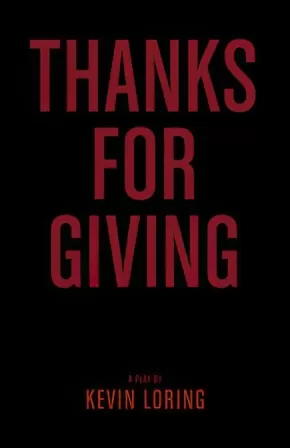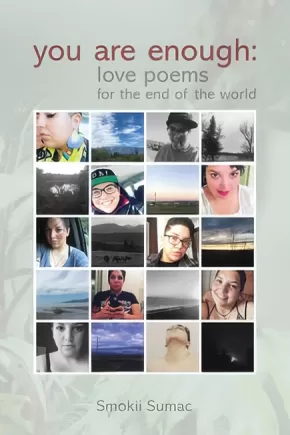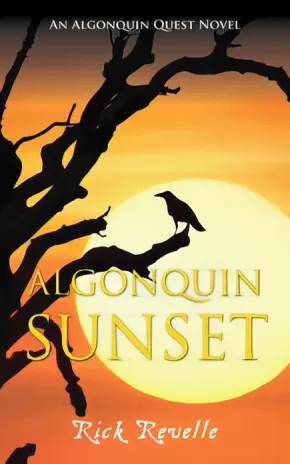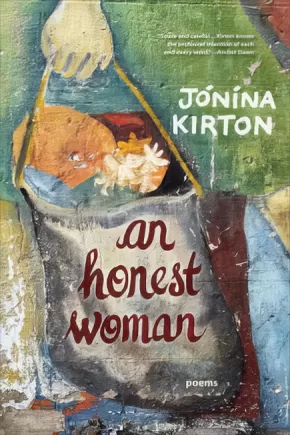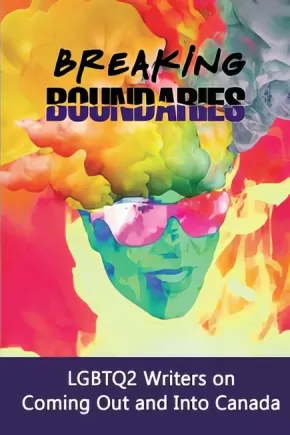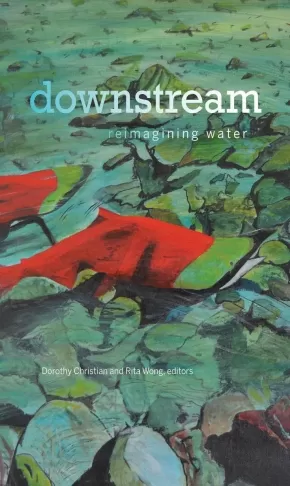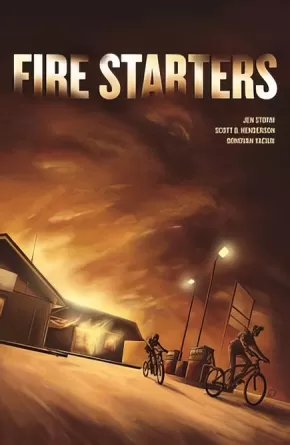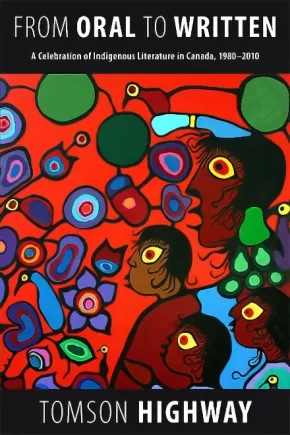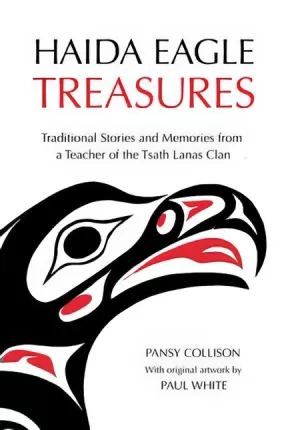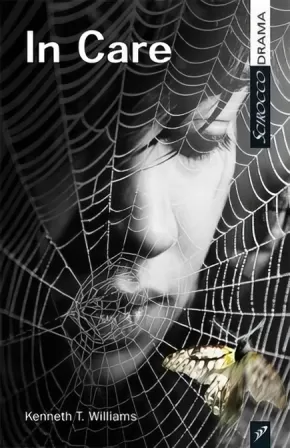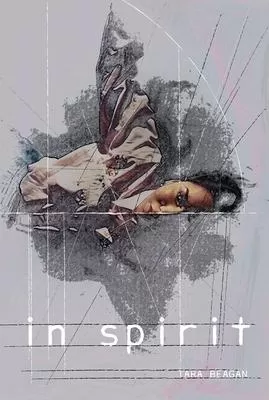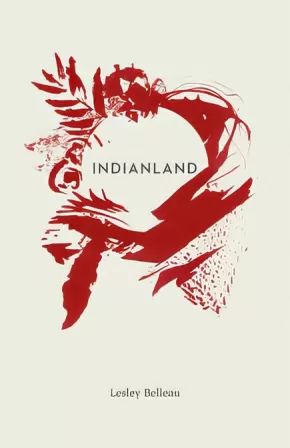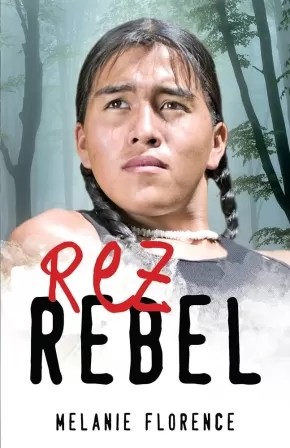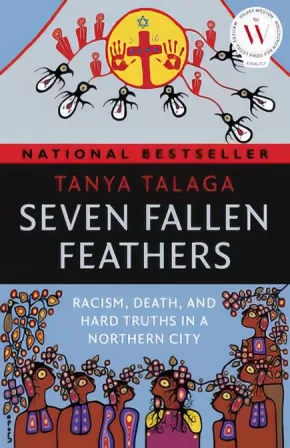
English Language Arts
76
-
90
of
146 Results;
Sort By
Go To
of 10
Thanks for Giving
$19.95
Format:
Paperback
Text Content Territories:
Indigenous Canadian;
ISBN / Barcode: 9781772012187
Synopsis:
Synopsis:
Kevin Loring is one of Canada's most promising young Indigenous playwrights.
Nan's family is home for Thanksgiving, but some unsolicited truths are about to be dropped at the dinner table. Old wounds and new realities collide, and sibling rivalry is stoked, but the enduring spirit that guides this family charges on, ever fierce. Thanks for Giving offers plenty to chew on. This intimate and restorative new play from Governor General's Literary Award winner Kevin Loring, the first ever Artistic Director of Indigenous Theatre at the National Arts Centre of Canada, is about legacy - the legacy of our personal and collective histories, and a family's legacy as it moves into an age where the assumptions of the old ways surrender to new possibilities. But if the play's main course is legacy, the dessert is pumpkin pie. Tuck in!
Reviews
"Loring has a lot to say - about colonialism, reconciliation, residential schools, intergenerational trauma and its contemporary effects, but also about the rich, matriarchal First Nations culture, Indigenous respect for the land, the need for new perspectives on history." - Globe and Mail
Educator Information
Recommended in the Canadian Indigenous Books for Schools 2019-2020 resource list for grades 10 to 12 for English Language Arts. Suitable for mature readers.
Additional Information
128 pages | 5.50" x 8.50"
you are enough: love poems for the end of the world
$15.00
Format:
Paperback
Text Content Territories:
Indigenous Canadian; First Nations; Ktunaxa (Kootenay);
ISBN / Barcode: 9781928120162
Synopsis:
Synopsis:
In his debut poetry collection you are enough: love poems for the end of the world, Smokii Sumac has curated a selection of works from two years of a near daily poetry practice. What began as a sort of daily online poetry journal using the hashtag #haikuaday, has since transformed into a brilliant collection of storytelling drawing upon Indigenous literary practice, and inspired by works like Billy Ray Belcourt's This Wound is a World, and Tenille Campbell's #IndianLovePoems.
The poems follow the haiku format, often stringing together three lines to tell a story. With sections dealing with recovery from addiction and depression, coming home through ceremony, and of course, as the title suggests, on falling in and out of love, Sumac brings the reader through two years of life as a Ktunaxa Two-Spirit person. This collection will move you as Sumac addresses the grief of being an Indigenous person in Canada, shares timely (and sometimes hilarious) musings on consent, sex, and gender, introduces readers to people and places he has loved and learned from, and through it all, helps us all come to know that we are enough, just as we are.
Awards
- 2019 Indigenous Voices Awards Winner for Published Poetry in English
Additional Information
108 pages | 5.50" x 8.50"
Algonquin Sunset
$12.99
Format:
Paperback
Text Content Territories:
Indigenous Canadian; First Nations; Anishinaabeg; Algonquin; Haudenosaunee (Iroquois); Kanyen'keha:ka (Mohawk); Mi'kmaq; Sioux; Lakota;
ISBN / Barcode: 9781459737020
Synopsis:
Synopsis:
Anokì and his sister Pangì Mahingan have grown up, and now face a decision that will change their lives forever.
Twelve years after Mahingan was wounded battling for his life against the Haudenosaunee warrior known as Ö:nenhste Erhar (Corn Dog), we rejoin his family and learn what fate held for him.
Now, his children, Anokì and Pangì Mahingan, along with their twin cousins Makwa and Wàbek, are grown and have adult responsibilities. Still living with their Algonquin family, they have become a formidable fighting unit with the addition of three Mi´kmaq warriors, E´s, Jilte´g, and the fierce Elue´wiet Ga´qaquj.
However, there is danger in the land of the setting sun, and nothing is more dangerous than what the family is going to encounter from the fierce enemy of their new Anishinaabe allies: the Lakȟóta.
Educator Information
Recommended Ages: 12-15.
Series Information
This novel is part of the Algonquin Quest Series, a series of young adult novels from Algonquin author Rick Revelle.
Additional Information
304 pages | 5.00" x 8.00"
An Honest Woman
$16.95
Format:
Paperback
Text Content Territories:
Indigenous Canadian;
ISBN / Barcode: 9781772011449
Synopsis:
Synopsis:
An Honest Woman by Jonina Kirton confronts us with beauty and ugliness in the wholesome riot that is sex, love, and marriage. From the perspective of a mixed-race woman, Kirton engages with Simone de Beauvoir and Donald Trump to unravel the norms of femininity and sexuality that continue to adhere today.
Kirton recalls her own upbringing, during which she was told to find a good husband who would “make an honest woman” out of her. Exploring the lives of many women, including her mother, her contemporaries, and well-known sex-crime stories such as the case of Elisabeth Fritzl, Kirton mines the personal to loosen the grip of patriarchal and colonial impositions.
An Honest Woman explores the many ways the female body is shaped by questions that have been too political to ask: What happens when a woman decides to take her sexuality into her own hands, dismissing cultural norms and the expectations of her parents? How is a young woman’s sexuality influenced when she is perceived as an “exotic” other? Can a woman reconnect with her Indigenous community by choosing Indigenous lovers?
Daring and tender in their honesty and wisdom, these poems challenge the perception of women’s bodies as glamorous and marketable commodities and imagine an embodied female experience that accommodates the role of creativity and a nurturing relationship with the land.
Reviews
“Jonina Kirton is courageously honest about her life experiences as a female of Indigenous and immigrant ancestry. Many poems resonate deeply, as we identify with her personal quest to figure out who she is, and the unacceptable things done to her. Her raw honesty is unsettling and uncomfortable, because it can be our truth too. Her poems depict devaluation and dehumanization, grieving, lessons learned. Her poems offer important insights as to why there are thousands of missing and murdered Indigenous women.” — Senator Lillian E. Dyck
“When writing from the voice of between, writer and reader have no place to hide. Assumptions and camouflage fall away. Murdered, missing, and violated women and girl voices have been silenced. The story lethally repeats. Kirton picks over how she was raised familially and culturally like a crime scene. Too, she affirms, ‘I have been here forever and I will rise again and again.’ Tough, eloquent, revelatory, these poems are the very ones we are desperately in need of.” — Betsy Warland, author of Oscar of Between: A Memoir of Identity and Ideas
“I’m sure people have been looking at me strangely every time I gasp, but I can’t glance away from the page for even a second to notice. Some of the poems end sharply, with a punch; some deliberately leave me searching for the next line; others show the repetition of heartbreaking cycles of violence and oppression, but offer a portrayal of resilience, too.” — All Lit Up!
Educator Information
This book would be useful for Women's Studies, Creative Writing, English Language Arts, Poetry, and English courses. Recommended for grades 11-12 and university-college students.
Please be advised, this book contains explicit sexual references and references to sexual and physical abuse.
Additional Information
104 pages | 6.00" x 9.00"
Breaking Boundaries: LGBTQ2 Writers on Coming Out and Into Canada
$13.95
Editors:
Format:
Paperback
ISBN / Barcode: 9780994730275
Synopsis:
Synopsis:
An anthology of stories and poetry written by Canadian LGBTQ2 authors who are immigrants, refugees, or Canada-born.
“What does it mean to be LGBTQ2 in Canada? The only possible answer to that question is one given in many voices. That is exactly what this book offers. There is struggle in these stories and poems, but there is also strength and resilience, compassion and determination. Woven together these voices leave me with a sense of hopefulness: a belief that the creativity and fierce commitment of our community will carry us forward as we work to create a Canada that lives up to the dream of freedom and safety it represents to so many people around the world.” — Robin Stevenson, author of Pride: Celebrating Diversity and Community
Review
The anthology pieces are diverse with authors who identify as Lesbian, Gay, Bisexual, Transgender and 2-Spirited. It also includes stunning artwork by LGBTQ artists and allies. — Rainbow Refugee Society
Authors & Artists
Authors in this anthology include Teryl Berg, Kyle Chen, Wendy Judith Cutler, Corrie Hope Furst, Kevin Henry, Anne Hofland, Chantal Hughes, Masaki Kidokoro, Dale Lee Kwong, Austin Lee, JL Lori, Eka Nasution (narrator), Adam Nixon, Rainer Oktovianus (narrator), Gail Marlene Schwartz, Caelan Sinclair, LS Stone, Sosania Tomlinson, E.T. Turner, and Hayley Zacks.
Artwork by Joni Danielson, Wokie Clark Fraser, Austin Lee, Trinity Lindenau, and Rainer Oktovianus.
Additional Information
146 pages | 6.00" x 9.00"
Edited by Lori Shwydky
This book contains memoirs, stories, poems, and artwork, which is why it appears in a variety of categories, such as both Fiction and Non-fiction, on our website.
downstream: reimagining water
$36.99
Format:
Paperback
Text Content Territories:
Indigenous Canadian;
ISBN / Barcode: 9781771122139
Synopsis:
Synopsis:
downstream: reimagining water brings together artists, writers, scientists, scholars, environmentalists, and activists who understand that our shared human need for clean water is crucial to building peace and good relationships with one another and the planet. This book explores the key roles that culture, arts, and the humanities play in supporting healthy water-based ecology and provides local, global, and Indigenous perspectives on water that help to guide our societies in a time of global warming. The contributions range from practical to visionary, and each of the four sections closes with a poem to encourage personal freedom along with collective care.
This book contributes to the formation of an intergenerational, culturally inclusive, participatory water ethic. Such an ethic arises from intellectual courage, spiritual responsibilities, practical knowledge, and deep appreciation for human dependence on water for a meaningful quality of life. downstream illuminates how water teaches us interdependence with other humans and living creatures, both near and far.
Reviews
"Downstream stakes out a bold and creative claim to collaborative and cross-cultural eco-spiritual-neo-traditional knowing and, with it, new approaches to policy and action. A timely read that lends depth and resonance to some of the material and voices [in other books on the subject]." — Heather Menzies, Literary Review of Canada, June 2017
"This rich collection brings together the work of artists, writers, scientists, scholars, environmentalists, and activists, all focusing on the looming global water crisis. ... Writing styles vary from piece to piece throughout the book—poetic, personal, journalistic, and academic—but the shifts between each are well worth navigating for any reader interested in human futures on Earth."— Publishers Weekly, August 2017
"This collection of works successfully expands our knowledge of and experience with water by merging natural science, social science, arts, and humanities approaches to water. It offers new, innovative, and engaging ways to think about and experience water, especially as it relates to life and vitality."— Sara Beth Keough, American Review of Canadian Studies, November -0001
Educator Information
This collection of essays is useful for these course/subject areas or topics: Language Arts & Disciplines; Creative Writing; Indigenous Studies; Poetry; Environmental Studies; Environmental Humanities.
Table of Contents
Introduction: Re-storying Waters, Re-storying Relations / Rita Wong and Dorothy Christian
Part I: Contexts for Knowing and Unknowing Water
1. Planetary Distress Signals / Alanna Mitchell
2. Water / Lee Maracle
3. Interweaving Water: The Incremental Transformation of Sovereign Knowledge into Collaborative Knowledge / Michael D. Blackstock
4. Water and Knowledge / Astrida Neimanis
5. Excerpts from “a child’s fable” / Baco Ohama
Part II: Water Testimonies: Witness, Worry, and Work
6. Water: The First Foundation of Life / Mona Polacca
7. From Our Homelands to the Tar Sands / Melina Laboucan Massimo
8. Keepers of the Water: Nishnaabe-kwewag Speaking for the Water / Renee Elizabeth Mzinegiizhigo-kwe Bedard
9. Water Walk Pedagogy / Violet Caibaiosai
10. A Response to Pascua Lama / Cecilia Vicuna
Part III: Shared Ethical and Embodied Practices
11. Moving with Water: Relationship and Responsibilities / Alannah Young Leon and Denise Marie Nadeau
12. Bodies of Water: Meaning in Movement / Seonagh Odhiambo Horne
13. Upstream: A Conversation with Water / Cathy Stubington
14. Ice Receding, Books Reseeding / Basia Irland
15. Tsunami Chant / Wang Ping
Part IV: A Respectful Co-existence in Common: Water Perspectives
16. Listening to the Elders at the Keepers of the Water Gathering /Radha D’Souza
17. Coastal Waters in Distress from Excessive Nutrients / Paul J. Harrison
18. Bodies of Water: Asian Canadians In/Action with Water /Janey Lew
19. Permeable Toronto: A Hydro-Eutopia / Janine MacLeod
20. Saturate/Dissolve: Water for Itself, Un-Settler Responsibilities, and Radical Humility / Larissa Lai
21. Bring Me Back / Janet Rogers
Additional Information
300 pages | 6.00" x 9.00"
Fire Starters
$18.95
Artists:
Format:
Paperback
Text Content Territories:
Indigenous Canadian; First Nations;
ISBN / Barcode: 9781553796855
Synopsis:
Synopsis:
Looking for a little mischief after finding an old flare gun, Ron and Ben suddenly find themselves in trouble when the local gas bar on Agamiing Reserve goes up in flames, and they are wrongly accused of arson by the sheriff’s son. As the investigation goes forward, community attitudes are revealed, and the truth slowly comes to light.
Reviews
"Storm's story is a very thoughtful look at the two systems of justice. The Native boys in the White system, being interrogated is a stark contrast to what the White boy experiences in the Native system of justice. It points to the path Storm is looking for: how a community can heal, rather than how it could punish and inflict more harm on people... I recommend Jen Storm's Fire Starters. There's a lot to study, think about, and of course, talk about." -- Debbie Reese, American Indians in Children's Literature
"Fire Starters reminds readers of the many perspectives involved in reconciliation. The story moves beyond Ron and Ben’s experiences as aboriginal teens poorly treated by a white community to include the experiences of law enforcement officers, family members, and even the arsonists themselves. Complementing the fast-paced plot, Henderson’s artwork is drawn from a wide variety of perspectives, and Yaciuk’s moody colours suit the rising tension experienced by all characters. A cautionary tale about the consequences of prejudice and racism, Fire Starters is a valuable addition to conversations about the importance of reconciliation and the power of the truth." -- Roseanne Gauthier, National Reading Campaign
Educator & Series Information
Recommended Grades: 6-9
Fire Starters is one book in The Debwe Series. This series features exceptional Indigenous writing from across Canada.
From Oral to Written: A Celebration of Indigenous Literature in Canada, 1980-2010
$35.00
Format:
Paperback
Text Content Territories:
Indigenous Canadian;
ISBN / Barcode: 9781772011166
Synopsis:
Synopsis:
Aboriginal Canadians tell their own stories, about their own people, in their own voice, from their own perspective.
If as recently as forty years ago there was no recognizable body of work by Canadian writers, as recently as thirty years ago there was no Native literature in this country. Perhaps a few books had made a dent on the national consciousness: The Unjust Society by Harold Cardinal, Halfbreed by Maria Campbell, and the poetry of Pauline Johnson and even Louis Riel. Now, three decades later, Native people have a literature that paints them in colours that are psychologically complex and sophisticated. They have a literature that validates their existence, that gives them dignity, that tells them that they and their culture, their ideas, their languages, are important if not downright essential to the long-term survival of the planet.
Tomson Highway’s From Oral to Written is a study of Native literature published in Canada between 1980 and 2010, a catalogue of amazing books that sparked the embers of a dormant voice. In the early 1980s, that voice rose up to overcome the major obstacle Native people have as writers: they are not able to write in their own Native languages, but have to write in the languages of the colonizer, languages that simply cannot capture the magic of Native mythology, the wild insanity of Trickster thinking. From Oral to Written is the story of the Native literary tradition, written – in multiple Aboriginal languages, in French, and in English – by a brave, committed, hard-working, and inspired community of exceptional individuals – from the Haida Nation on Haida Gwaii to the Mi’kmaq of Nova Scotia’s Cape Breton Island.
Leading Aboriginal author Tomson Highway surveys the first wave of Native writers published in Canada, highlighting the most gifted authors and the best stories they have told, offering non-Native readers access to reconciliation and understanding, and at the same time engendering among Native readers pride in a stellar body of work.
Reviews
“We gratefully acknowledge the work of those artists who have come before, and those that continue, building bridges across our cultures through their authentic words. Tomson Highway’s readings each demonstrate that within our stories, we pass along our teachings and we build upon the strength inside each one of us. We are arriving. Back to our lands, back to our stories, back to our truths, unwrapping old words and sharing wisdom. We, are coming home.” —Terri Mack, Strong Nations
“A rich compilation of Indigenous literature that will be a gift for Canadian school curriculums, also well suited for those Canadians in search of understanding and reconciliation. More importantly this book is what Indigenous people need because, like me, they will discover their lives in the many stories. If I had this as a teenager, I would have understood that I was not alone in the darkness I lived. I would have seen that others found a way out. Bravo, Tomson Highway!” ―Bev Sellars, author of They Called Me Number One: Secrets and Survival at an Indian Residential School and Price Paid: The Fight for First Nations Survival
Educator Information
Recommended in the Canadian Indigenous Books for Schools 2019-2020 resource list as a Teacher Resource.
Additional Information
|
Haida Eagle Treasures: Traditional Stories and Memories from a Teacher of the Tsath Lanas Clan
$24.95
Artists:
Format:
Paperback
Text Content Territories:
Indigenous Canadian; First Nations; Haida; Eagle Clan (Ts'aahl);
ISBN / Barcode: 9781550597486
Synopsis:
Synopsis:
Take a journey into the heart of Haida culture as it is lived and experienced by an extraordinary woman of the Tsath Lanas Eagle Clan. Pansy Collison, a Haida woman born and raised in Old Massett on Haida Gwaii, tells stories of her clan and community, as well as personal narratives about her history and family. Haida Eagle Treasures embodies a strong Haida woman’s voice, offering a rare glimpse inside Haida culture. Each story and memory is a treasure that captures part of the beauty of the Haida worldview and way of life.
Now retired, Pansy taught for 23 years at elementary, secondary, and college levels. From these experiences, she describes some of the challenges and contradictions of living between two worlds. Pansy’s teaching skills, artistic talents, and political affiliations keep her involved in politics and education on Haida Gwaii.
Thirteen original illustrations by Pansy’s brother, Paul White, a gifted artist, teacher, pole carver and designer, provide the guideposts within Haida Eagle Treasures.
Educator Information
Recommended in the Canadian Indigenous Books for Schools 2019-2020 resource list as being useful for grades 8-12 for English Language Arts and Social Studies.
Caution: use of the term "Native" throughout.
Additional Information
244 pages | 6.00" x 9.00" | 2nd Edition
In Care
$15.95
Format:
Paperback
Text Content Territories:
Indigenous Canadian;
ISBN / Barcode: 9781927922309
Synopsis:
Synopsis:
In Care is about a mother's quest to get her children out of foster care. Janice Fisher has not had an easy life. She worked the streets as a teenager, was addicted to cocaine, and had her first daughter taken from her when she was just 15. But she's since turned her life around, and is a good mother to three happy girls -- until a false accusation gets them apprehended by foster care. Now, Janice is trapped in the system like a butterfly in a spider's web: the more she struggles to get out, the more stuck she gets. In Care is both an indictment of the racism that's inherent in our system and a tribute to the strength people as disadvantaged as Janice must have in order to survive.
Educator Information
Recommended in the Canadian Indigenous Books for Schools 2019-2020 resource list as being useful for grades 10 to 12 for these subjects: Acting, Drama, English Language Arts, and Social Studies.
This work includes mature subject matter with references to drug use and prostitution.
Additional Information
96 pages | 5.50" x 8.50"
In Spirit
$17.95
Format:
Paperback
Text Content Territories:
Indigenous Canadian;
ISBN / Barcode: 9781770918061
Synopsis:
Synopsis:
Twelve-year-old Molly was riding her new bicycle on a deserted road when a man in a truck pulled up next to her, saying he was lost. He asked if she could get in and help him back to the highway, and said he could bring her back to her bike after. Molly declined, out of interest for her own safety. The next things Molly remembers are dirt, branches, trees, pain, and darkness.
Molly is now a spirit.
Mustering up some courage, she pieces together her short life for herself and her family while she reassembles her bicycle—the same one that was found thrown into the trees on the side of the road. Juxtaposed with flashes of news, sounds, and videos, Molly’s chilling tale becomes more and more vivid, challenging humanity not to forget her presence and importance.
Reviews
“Tara Beagan's In Spirit distills the tragic disappearance of hundreds of native women along BC's Highway of Tears into a powerful theatrical experience.” —Jon Kaplan, NOW Magazine
“In Spirit is a very touching piece, not only for the content, but also because of how we were transported into this little girl’s world… It is a refreshing change to see a play tackle a societal defect without hate and guilt. Through love and empathy, it reminds us of the missing women and the horrors that are still taking place in our county.” —Emma Letki, Mooney on Theatre
Educator Information
This play is listed in the 2018-2019 Canadian Indigenous Books for Schools list as a resource for Grades 11-12 for these subjects: Acting, Drama, English Language Arts.
Caution: discussion of violence and death.
Additional Information
64 pages | 5.13" x 7.65"
Indianland
$18.95
Format:
Paperback
Text Content Territories:
Indigenous Canadian; First Nations; Anishinaabeg; Ojibway;
ISBN / Barcode: 9781894037921
Synopsis:
Synopsis:
Indianland is a rich and varied poetry collection. The poems are written from a female and Indigenous point of view and incorporate Anishinaabemowin throughout. Time is cyclical, moving from present-day back to first contact and forward again. Themes of sexuality, birth, memory, and longing are explored, images of blood, plants (milkweed, yarrow, cattails), and petroglyphs reoccur, and touchstone issues in Indigenous politics are addressed (Elijah Harper, Murdered and Missing Indigenous Women, forced sterilizations, Oka).
Educator Information
Recommended in the Canadian Indigenous Books for Schools 2019-2020 resource list as being useful for grades 11 and 12 for these subjects: English Language Arts, Media Studies, and Social Studies.
This work includes sexual content, references to rape, and mature content.
Additional Information
80 pages | 5.50" x 8.50"
Little Athapapuskow: A Métis Love Story (4 in stock, Out of Print)
$20.00
Artists:
Format:
Paperback
Text Content Territories:
Indigenous Canadian; Métis;
ISBN / Barcode: 9781926795829
Synopsis:
Synopsis:
Little Athapapuskow is collection of poems named after a lake Guy Freedman grew up on near Flin Flon, Manitoba. They represent his efforts to challenge Catholicism and its complicity with the Confederation project, which dismantled the New Nation developing in the Canadian Northwest. The poems are organized into three parts—past, present, and future—and they address the inter-generational impacts of the Church on his family in relation to the doctrine of the Holy Trinity. This book is his love song to his home and to his country.
Educator Information
Recommended resource for Grades 10-12 English Language Arts and Social Studies.
Contains poems about the history of the Métis people, family, love, celebration of culture, colonialism, religion, violence.
Caution: Some poems contain strong language and mature subject matter, such as discussions of violence, alcoholism, and sexuality.
Additional Information
86 pages | 7.25" x 5.75 "
Rez Rebel
$12.95
Format:
Paperback
Text Content Territories:
Indigenous Canadian; First Nations;
ISBN / Barcode: 9781459411999
Synopsis:
Synopsis:
Floyd Twofeathers has always trusted his mom, a traditional healer, and his dad, hereditary chief of their band, to take care of the people on their reserve. But a lack of educational and career opportunities, medical support and counselling has left young people feeling that they have no future. As suicides pile up, Floyd finds that his friends and kids he knows are taking their own lives because they feel that they have no future — but his father refuses to listen to Floyd's attempts to find a realistic solution. When Floyd's father is overwhelmed by the situation and succumbs to alcohol and depression, it is up to Floyd to turn around his community's descent into crisis before it's too late.
Set in a situation of suicide contagion among young people in Aboriginal communities, this novel follows one teenager's determined efforts to help his friends and his community find solutions.
Reviews
"This was an incredibly moving book about the hardships Indigenous people and the increasing amount of suicides happening on reservations."— Amanda Wood,, NetGalley Reviewer, June 2017
"The voice she uses, that of a determined young man who refuses to accept the status quo is believable, direct and engaging."— Chris Benjamin,, Atlantic Books Today, June 2017
"A good opening into Native American reservations and their issues that the federal government needs to address."— Mai Khanh Nguyen,, Educator, NetGalley Reviewer, June 2017
"This is a look at life that few people who don't live it ever get to see. A raw, unapologetic look. It's brilliantly written and heartbreaking, knowing how hopeless these kids feel. "— Liliyana Shadowlyn, Reviewer, NetGalley, October 2017
Educator Information
Recommended in the Canadian Indigenous Books for Schools 2019-2020 resource list for grades 8 to 12 for English Language Arts.
Strong language and discussion of suicide within this work may trigger some readers.
Additional Information
176 pages | 5.50" x 8.50"
Seven Fallen Feathers: Racism, Death, and Hard Truths in a Northern City
$22.99
Format:
Paperback
Text Content Territories:
Indigenous Canadian; First Nations; Anishinaabeg; Ojibway;
ISBN / Barcode: 9781487002268
Synopsis:
Synopsis:
In 1966, twelve-year-old Chanie Wenjack froze to death on the railway tracks after running away from residential school. An inquest was called and four recommendations were made to prevent another tragedy. None of those recommendations were applied.
More than a quarter of a century later, from 2000 to 2011, seven Indigenous high school students died in Thunder Bay, Ontario. The seven were hundreds of miles away from their families, forced to leave home and live in a foreign and unwelcoming city. Five were found dead in the rivers surrounding Lake Superior, below a sacred Indigenous site. Jordan Wabasse, a gentle boy and star hockey player, disappeared into the minus twenty degrees Celsius night. The body of celebrated artist Norval Morrisseau’s grandson, Kyle, was pulled from a river, as was Curran Strang’s. Robyn Harper died in her boarding-house hallway and Paul Panacheese inexplicably collapsed on his kitchen floor. Reggie Bushie’s death finally prompted an inquest, seven years after the discovery of Jethro Anderson, the first boy whose body was found in the water.
Using a sweeping narrative focusing on the lives of the students, award-winning investigative journalist Tanya Talaga delves into the history of this small northern city that has come to manifest Canada’s long struggle with human rights violations against Indigenous communities.
A portion of each sale of Seven Fallen Feathers will go to the Dennis Franklin Cromarty Memorial Fund, set up in 1994 to financially assist Nishnawbe Aski Nation students’ studies in Thunder Bay and at post-secondary institutions.
Awards
- 2018-2019 First Nation Communities Read
- 2018 RBC Taylor Prize
Reviews
“Talaga has written Canada’s J’Accuse, an open letter to the rest of us about the many ways we contribute — through act or inaction — to suicides and damaged existences in Canada’s Indigenous communities. Tanya Talaga’s account of teen lives and deaths in and near Thunder Bay is detailed, balanced and heart-rending. Talaga describes gaps in the system large enough for beloved children and adults to fall through, endemic indifference, casual racism and a persistent lack of resources. It is impossible to read this book and come away unchanged.” — RBC Taylor Prize Jury Citation
“In Seven Fallen Feathers, Tanya Talaga delves into the lives of seven Indigenous students who died while attending high school in Thunder Bay over the first eleven years of this century. With a narrative voice encompassing lyrical creation myth, razor-sharp reporting, and a searing critique of Canada’s ongoing colonial legacy, Talaga binds these tragedies — and the ambivalent response from police and government — into a compelling tapestry. This vivid, wrenching book shatters the air of abstraction that so often permeates news of the injustices Indigenous communities face every day. It is impossible to read Seven Fallen Feathers and not care about the lives lost, the families thrust into purgatory, while the rest of society looks away.” — Hilary Weston Writers’ Trust Prize for Nonfiction Jury Citation
“[A]n urgent and unshakable portrait of the horrors faced by Indigenous teens going to school in Thunder Bay, Ontario, far from their homes and families. . . . Talaga’s incisive research and breathtaking storytelling could bring this community one step closer to the healing it deserves.” — Booklist, STARRED REVIEW
“Seven Fallen Feathers may prove to be the most important book published in Canada in 2017. Tanya Talaga offers well-researched, difficult truths that expose the systemic racism, poverty, and powerlessness that contribute to the ongoing issues facing Indigenous youth, their families, and their communities. It is a call to action that deeply honours the lives of the seven young people; our entire nation should feel their loss profoundly.” — Patti LaBoucane-Benson, author of The Outside Circle
“[W]here Seven Fallen Feathers truly shines is in Talaga’s intimate retellings of what families experience when a loved one goes missing, from filing a missing-persons report with police, to the long and brutal investigation process, to the final visit in the coroner’s office. It’s a heartbreaking portrait of an indifferent and often callous system . . . Seven Fallen Feathers is a must-read for all Canadians. It shows us where we came from, where we’re at, and what we need to do to make the country a better place for us all.” — The Walrus
Educator Information
The Canadian Indigenous Books for Schools list recommends this resource for Grade 12 English Language Arts and Social Studies.
Curriculum Connections: Indigenous Studies, History, Health
Additional Information
376 pages | 5.50" x 8.50" | 8-page colour insert and maps
Sort By
Go To
of 10

